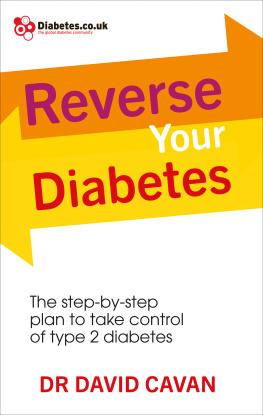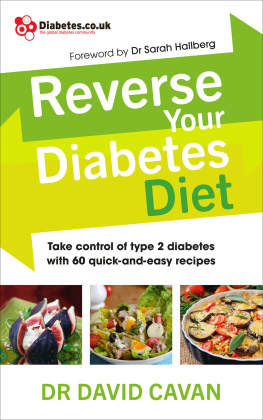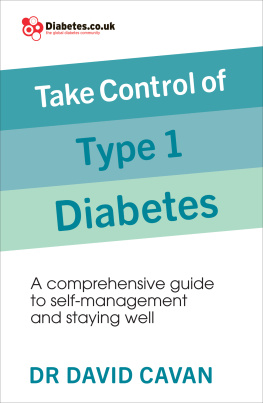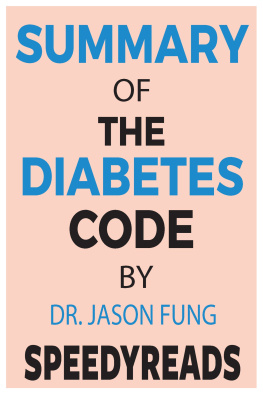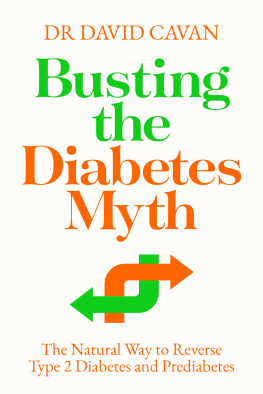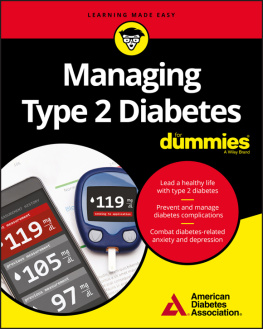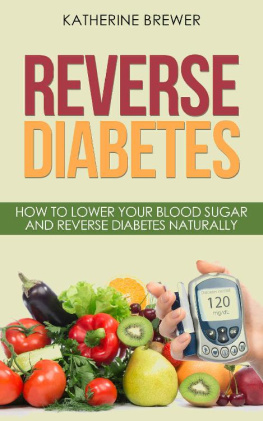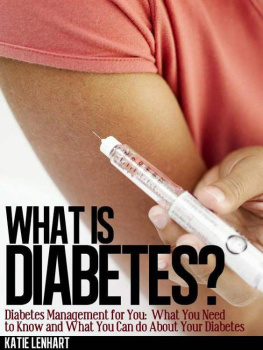CONTENTS
About the Book
You can not only control your diabetes, but actually reverse it
Reverse Your Diabetes presents a clear lifestyle plan to manage type 2 diabetes and even reverse it. Written by diabetes expert Dr David Cavan and based on the latest clinical research and trials, it tackles the myths and misinformation that surround diabetes and explains what to do to turn your health around.
- Dramatically improve and even reverse type 2 diabetes
- Lose weight and feel more energetic
- Learn to take control of your health
About the Author
Dr David Cavan MD, FRCP is a medical doctor who worked for 17 years as Consultant Physician at the Bournemouth Diabetes and Endocrine Centre, one of the leading diabetes centres in the UK. He has expertise in all areas of diabetes management, particularly intensive management of type 1 diabetes, dietary management of type 2 diabetes and the development of self-management education programmes. Dr Cavan has also been Clinical Director of Medicine at the Royal Bournemouth Hospital and Chair of the Education and Psychosocial Section of Diabetes UK, where he contributed to the development of the National Service Framework for Diabetes. In addition, Dr Cavan co-founded the Diabetes Education Network, which supports diabetes centres across the UK and helps them develop structured education programmes. In 2013 he moved to Brussels to join the International Diabetes Federation as Director of Policy and Programmes. In this role he oversees a global network of programmes to promote improved care and education for people with diabetes as well as prevention of type 2 diabetes.
Dedicated to the memory of
Tony Cavan

Any references to writing in this book refer to the original printed version. Readers should write on a separate piece of paper in these instances.
This ebook is copyright material and must not be copied, reproduced, transferred, distributed, leased, licensed or publicly performed or used in any way except as specifically permitted in writing by the publishers, as allowed under the terms and conditions under which it was purchased or as strictly permitted by applicable copyright law. Any unauthorized distribution or use of this text may be a direct infringement of the authors and publishers rights and those responsible may be liable in law accordingly.
Version 1.0
Epub ISBN 9781448176205
www.randomhouse.co.uk
1 3 5 7 9 10 8 6 4 2
Vermilion, an imprint of Ebury Publishing,
20 Vauxhall Bridge Road,
London SW1V 2SA
Vermilion is part of the Penguin Random House group of companies whose addresses can be found at global.penguinrandomhouse.com
Copyright Dr David Cavan and Diabetes Digital Media Limited 2014
David Cavan has asserted his right to be identified as the author of this Work in accordance with the Copyright, Designs and Patents Act 1988
First published by Vermilion in 2014
www.eburypublishing.co.uk
A CIP catalogue record for this book is available from the British Library
ISBN 9780091948252
PREFACE
I have worked as a diabetes specialist for many years. Very early on, I came to realise that the vast majority of diabetes management is done by the person with diabetes, and therefore it is essential that everyone with diabetes is given the appropriate training and education that will enable them to manage their diabetes as well as possible.
From 1996 until 2013, I worked as a consultant at the Bournemouth Diabetes and Endocrine Centre. During that time I developed my interest in patient education and launched a self-management programme for people with type 1 diabetes called BERTIE. I also helped develop an education programme for people with type 2 diabetes called Focus on Diabetes. Focus had been started originally in 1993 and in its time was quite radical providing high-quality education to people at the time of diagnosis with type 2 diabetes as part of their routine care. The programme continues, in a different form, to this day. The key message of the programme was to encourage people to change their lifestyles. Many did, and as a result their diabetes control improved dramatically and quickly too. However, after a few years it became apparent that the improvements we saw began to disappear and at this stage it would be common to start them on tablets to help control their diabetes.
During the early years of this century the emphasis shifted to using medication to achieve as near-normal levels of blood glucose as possible; in more and more cases this would include the use of insulin. Initially this led to good improvements in diabetes control, but over time I could see that many people were beginning to put on weight, and once again the improvements would reverse. As I will describe in the book, a number of new medications have been introduced over the past 10 years. Each one came full of promise and, like insulin, often led to temporary improvements. But over time their effects diminished and in some cases the drugs have been withdrawn because of safety concerns.
I now began to question the medical training I had received that had focused so much attention on medication as the best way of controlling type 2 diabetes. I also began to question the standard dietary advice for people with diabetes, namely to base all meals on carbohydrates. As all carbohydrates are broken down in the body into glucose it seemed an illogical way to keep blood glucose levels under control. I followed the experiences of people with diabetes who contributed to Internet chat forums (such as diabetes.co.uk and diabetes-support.org.uk) and increasingly came to understand the concerns many held about the treatment they were receiving using established medical and dietary practice. In 2011 I began to suggest to people with type 2 diabetes that rather than increase their medication they could try reducing their carbohydrate intake instead. And in many cases it worked. Over the next year I began to recommend this as the preferred option, and saw many people gain good control of their diabetes including some who came off insulin altogether after many years of injecting.
This certainly challenged the conventional wisdom that type 2 diabetes is a progressive disease that, over time, will likely require long-term treatment with insulin. The realisation that people could actually come off insulin if they changed their diet suggested to me that what they were eating had a far more powerful effect on their diabetes than any medication. It also was consistent with newly emerging research-based evidence that type 2 diabetes can actually be reversed. These results initially came from people with diabetes who had weight-loss surgery and afterwards no longer had diabetes. Others, who had lost weight by other means, also were able to reverse their diabetes.
This in turn has led to a greater understanding about the nature of type 2 diabetes: far from being a progressive one-way street we now understand that the progression of diabetes can be halted, and even reversed, by dietary changes. This is because the accumulation of fat in the body appears to be directly responsible for at least some of the changes that occur in diabetes namely insulin resistance (that is, insulin not working properly), high blood glucose levels and weight gain. Losing weight leads to loss of fat from the body, lower glucose levels and less insulin resistance.
Next page
